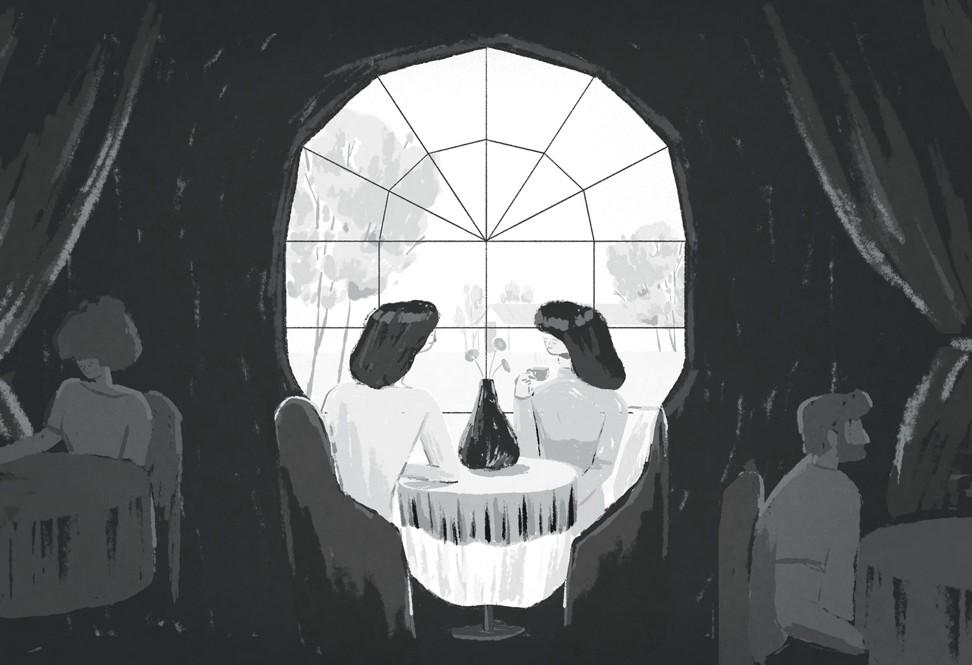Toxic friends: why we don’t need unhealthy relationships and how to pull the plug
Feeling drained? A balance sheet of benefits and deficits in a difficult relationship will help determine whether it’s time to put some distance between you and your friend, or cut them from your life

We’ve all got one – somebody with whom we share a tricky relationship. Somebody we feel bound to even though they make it feel like hard work.
It’s not uncommon to put up with such relationships, as recent research confirmed. A study on “difficult ties” – conducted by researchers at the University of California Berkeley and Bar-Ilan University in Israel – canvassed more than 1,000 participants, who between them described 12,000 relationships.

We’ve all got one – a friend who’s hard work. Illustration: Kaliz Lee
Associate professor Shira Offer, one of the study leaders, says sometimes those difficult relationships may be with a family member, “so we cannot simply walk away”. But sometimes, we are tied to people outside the family.
One of the best examples is when people at work – bosses or peers – are difficult. Sure, people could disengage from difficult colleagues by quitting their job but usually they won’t do this because the costs are too high. So we’re stuck with family and we’re stuck with colleagues.
Get rich and popular in the Year of the Dog: 5 tips from feng shui expert Thierry Chow
By contrast, Offer says, friends are less likely to be perceived as difficult because we have more freedom in choosing our friends. That doesn’t mean they aren’t ever difficult.
“A good friend could become burdensome, but because of our prior commitment to them, our shared history, we’ll feel obliged to keep them in our network, even when they’re being difficult,” she says.

Dr. Shira Offer, of the department of sociology and anthropology at Bar-Ilan University in Israel.
And because we can choose our friends, when it goes wrong, it can be painful. Some friendships become so difficult that they are referred to as toxic.
“I don’t know why I allowed it to go on for so long’, says Helen, as she reflects on a friendship of 10 years. “I let it to consume me so that in the end I felt trapped.”
Helen and Anna met when Anna moved to the suburb where Helen lived. “We found ourselves in the same community, had babies at the same time. It evolved from there,” Helen recalls, adding that she welcomed the newcomer and supported her.
We all occasionally say or do things that are less than exemplary, whereas toxic friends exhibit a pattern of damaging behaviour
“I can’t pinpoint when the shift came. I don’t even know how or why, but suddenly Anna was the one who had seemed to have been there forever. I felt supplanted. She became controlling, condescending. I was sidelined. The whole dynamic of our friendship changed.”
Unhealthy friendships, as Helen’s with Anna became, are unfulfilling. The give and take that sustains good friendships goes. All this conspires to create a stress that Helen can testify to.
“In the end I hated being around Anna so much that I’d make excuses not to take her calls, yet we seem compelled to sustain the attachment because articulating our grievances directly is difficult. As result, our negative feelings fester. I did try to explain to Anna why she’d upset me once in the hope she’d understand why I was avoiding her, but it never made any difference.”
Should your partner be your best friend too? It works for Michelle Obama, but not for Anna Faris, and experts are split on the issue
New Yorker Florence Isaacs who wrote Toxic Friends, True Friends: How Your Friends Can Make or Break Your Health, Happiness, Family, and Career, says you’ll know a friendship is becoming toxic if it is regularly unsupportive, unequal.
‘The key word is ‘regularly’; we all occasionally say or do things that are less than exemplary, whereas toxic friends exhibit a pattern of damaging behaviour,” Isaacs says.
A good test of a friendship going toxic, she suggests, “is to write up a balance sheet. One column lists the positive benefits you get from the relationship and the other lists the deficits in the relationship. If the second column outweighs the first for more than a short period of time, you need to ask yourself: what am I getting out of this? Why am I in this relationship?”

Hong Kong counsellor Tim Hoffman.
Hong Kong counsellor Tim Hoffman says there are lots of reasons we find ourselves in such relationships.
“We might unconsciously believe we aren’t worthy, or, for fear of being abandoned, we may pick someone who can’t leave us – somebody who is very dependent,” Hoffman says.
He notes that it can be hard, once you’re in a collapsing relationship, to identify why it’s making you feel uncomfortable. Like Isaacs, he advocates asking questions of ourselves: Does this person treat me well? Do I become a better person around them?
Helen knew the answers to those. No and no.
“We must consider what is driving our behaviour. Without that understanding, it’s difficult to extricate ourselves from toxic relationships, and all too easy to fall into new ones,” Hoffman says.
But disengaging isn’t simple. You need to be able to admit to yourself how drained a friend leaves you feeling and then work towards reclaiming your power and your right to fulfilling, positive interactions by reminding yourself that happy relationships are supportive and mutually beneficial, counsellors say.
Empathy: why we need more of it in a polarised world, and how to cultivate the human touch
Sometimes, confiding in a friend who does make you feel good about yourself can be useful. In Helen’s case, it took a relocation. She moved enough of a distance away that making excuses not to spend time with Anna was easier and more plausible, and the move gave her the space for a little self-auditing. Today she can meet Anna and “put up” with her for abbreviated periods of time.
“I laugh at her nonsense now. I’ve realised I don’t need her so she no longer holds a powerful place in my life,” she says.
The stress and strain of a difficult friendship can be too much to handle. Photo: Alamy
Suzanne Degges-White, author of Toxic Friendships: Knowing the Rules and Dealing with the Friends Who Break Them, highlights red flags and tips on how to extricate yourself.
Five red flags
1. You realise that hanging out with a particular friend leaves you feeling worse, not better, after time together.
2. You find yourself avoiding a friend or delaying your responses to her/his texts or phone calls.
3. Your friend seems to “like you” or want to spend time with you only when she or he needs something from you, but is less willing to be there when you need her/him.
4. Your friend tries to isolate you from other relationships in your life – for instance, making negative comments about your romantic partners or other friends, or badmouths you to others behind your back.
5. Your friend is unable to celebrate the “ups” in your life and can’t enjoy your successes.
How couples can survive, even thrive, after one partner’s affair
Five get-outs
1. Don’t let a toxic relationship go on too long. Don’t delay the inevitable – it just gets harder the longer you wait, like dragging out the removal of a Band-Aid.
2. If it’s a friend that you only communicate with via social media or texting, fading away is probably doable without much drama, but that’s about the only time it would be OK.
3. Everyone pretty much knows that when someone complains about being “too busy” to catch up, it is code for “you’re off my A-list”. Don’t hide behind your job, your family, or other commitments. Remember, if you’re too convincing with excuses, you are only setting yourself up to deal with future efforts to keep someone’s name off your social calendar.
4. Weigh your “break up” speech carefully and make it about you – not them. Use “I” statements and own your feelings. Being honest can be a final parting gift for your soon-to-be ex-friend that may actually benefit her in the long run.
5. Avoid collateral damage as much as you can. If other friends may feel the need to take sides, approach them as soon as possible so that potentially tricky social situations can be prevented, if possible. In the case of mutual friends, be prepared for some causalities.
I laugh at her nonsense now. I’ve realised I don’t need her so she no longer holds a powerful place in my life
To avoid this type of relationship in the future, remember to trust your instincts. If a relationship seems too perfect to be true, that’s a warning sign that the new person in your life may be playing out a role that they know would appeal to you. Give that relationship space and time – don’t go overboard and become “overnight besties” or begin an “exclusive dating relationship” before you really get to know someone.
People that often turn out to be the most toxic relationship partners are often uncanny in their ability to play out the role that you need them to play at the start of a relationship, experts say. Keep your eyes open and be aware of your own feelings. We can’t always predict the future with 100 per cent certainty, but our gut instincts have an amazingly high rate of accuracy when it comes to our own best interests.
Comments
Post a Comment